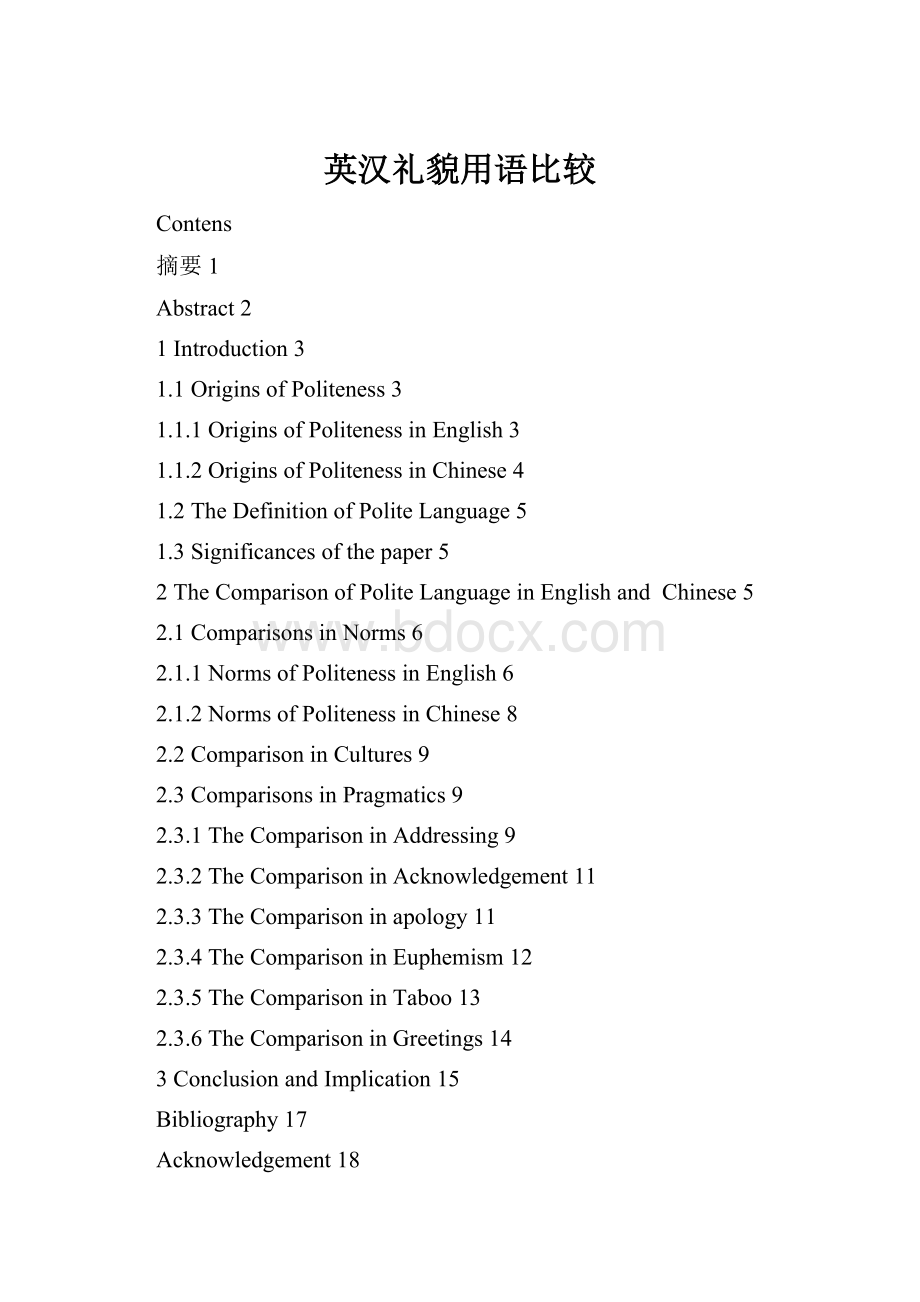英汉礼貌用语比较.docx
《英汉礼貌用语比较.docx》由会员分享,可在线阅读,更多相关《英汉礼貌用语比较.docx(15页珍藏版)》请在冰豆网上搜索。

英汉礼貌用语比较
Contens
摘要1
Abstract2
1Introduction3
1.1OriginsofPoliteness3
1.1.1OriginsofPolitenessinEnglish3
1.1.2OriginsofPolitenessinChinese4
1.2TheDefinitionofPoliteLanguage5
1.3Significancesofthepaper5
2TheComparisonofPoliteLanguageinEnglishandChinese5
2.1ComparisonsinNorms6
2.1.1NormsofPolitenessinEnglish6
2.1.2NormsofPolitenessinChinese8
2.2ComparisoninCultures9
2.3ComparisonsinPragmatics9
2.3.1TheComparisoninAddressing9
2.3.2TheComparisoninAcknowledgement11
2.3.3TheComparisoninapology11
2.3.4TheComparisoninEuphemism12
2.3.5TheComparisoninTaboo13
2.3.6TheComparisoninGreetings14
3ConclusionandImplication15
Bibliography17
Acknowledgement18
英汉礼貌用语比较
摘要
众所周知,英汉语言里面存在不同的礼貌用语,它们是人类社会文明的标志,因而理解英汉的礼貌用语是非常有必要的。
本文较系统地介绍了英汉礼貌用语及其起源,并且从准则,文化,语用学三个方面详细比较了英汉礼貌用语差异。
我们在与母语是英语的人交流时,应该注意他们的礼貌用语特点,运用这些特点来进行轻松愉快的交流,尽最大的努力去避免出现使用礼貌用语不当的情况来使交流和谐友好地进行下去。
关键词:
礼貌用语;准则;语用学;交流
TheComparisonofPoliteLanguage
inEnglishandChinese
Abstract
Aseverybodycansee,therearedifferentpolitelanguagesinEnglishandChinese,whichsymbolizesthecivilizationofhumansociety.ItisnecessarytocomprehendthepolitelanguagesinEnglishandChinese.ThisarticleintroducesthepolitelanguagesinEnglishandChineseaswellastheiroriginssystematically,comparingtheprinciples,cultures,andpragmaticsofpolitelanguageinbothofthem.WhenwecommunicatewithnativeEnglishspeakers,specialattentiontothepropertiesofthepolitelanguagesinEnglishneedstobepaid.Weshouldapplythesepropertiestopracticalcommunication,toarriveataneasyandhappyintercourse.Inordertogetaharmoniousandfriendlyprogressingofcommunication,weneedtotrybesttoavoidtheemergenceofimproperuseofpolitelanguages.
Keywords:
politelanguage,principle,pragmatics,communication.
TheComparisonofPoliteLanguage
inEnglishandChinese
1Introduction
Becauseofculturalobstacle,wemayfrequentlyfindthatpeoplemisunderstandinformationeachother,evenhurttheothersideininterculturalcommunication.Sometimes,kindwordswillmakepeoplefeelembarrassed,courteousmannerswillbemisunderstoodasabsurdandvulgarbehaviors.Therefore,studyingpolitelanguagesisessential.ThispartwilltalkaboutoriginsofpolitenessinEnglishandinChinese,thedefinitionofpolitenessandthesignificanceofthepaperforthepurposetomakethereadershaveaclearunderstandingofpolitenessindifferentlanguagesandtoimprovepeople’sawarenessofpoliteness.
1.1OriginsofPoliteness
ThispartwillfocusontheoriginsofpolitenessinEnglishandinChinesetohelpthereadersgenerallycomprehendtheoriginsofpolitenessindifferentlanguages.
1.1.1OriginsofPolitenessinEnglish
InEnglish,theproductionandthedevelopmentoftheconceptofpolitenesshaveseenacontinualchange.InEnglish,politenesswasconnectedwiththecourtandthecityattheearlytime.Fromtheperspectiveofetymology,politenessisderivedfrompolite,andpolitewasfromtheLatinword,politus,whichmeanstosmooth,topolish.(KleinErnest,1966,p1210)[10]Insomesense,beingpoliteispolishingtheperson’sbehaviortomakethepersonmoreacceptable,ortoshowtherespect.Duringthetimebetween1150and1500,anyyoungmanwhosoughttoearnhislivingasascribelearnedLatinorFrenchbecausetherewasnomarketforsuchservicesinEnglish.(ZhangWeiyou,2004,p27)[12]Furthermore,fromtheperspectiveofroot,theroot,polit,ofpolite,hasthedirectrelationwiththeGreekroot,polisandpoliteia,whichrefertothecityorthegovernmentofcity.(CornogMarywood,2002,p45)[7]Wordswiththiskindofroot,mostly,expressthegoodmannersofthepeopleinthecityofthecourt.AsHeZhaoxiongputs,“manyscholars’findingshaveprovedthelinkbetweenpolitenessandthecourtandthecityinvocabulary.Sometime,thebehaviorofpeopleinthecourtwasregardedaspolite,andsometimeinthecity.”(何兆熊,2000,p15)[2]
1.1.2OriginsofPolitenessinChinese
WhenitcomestopolitenessinChinese,averylongstorywillbepointedout,andapersonmustn’tbeneglected,thatis,Confucius,aneminentChinesephilosopherandteacherwhofoundedConfucianism.Sureenough,asastateofceremonies,thepolitenessinChineseisendless.Infact,beforeConfucius’time,therehadbeensomedifferentso-called“rites”,suchasritesinXia,Shang,andZhouDynasties.Confuciusjustepitomizedallkindsoftheritesbeforehim.Theriteinoldtimesisnotcompletelythepolitenessrightnow.Itsconnotationhaschangedverymuch,moreprecisely,hasbecomemoreelaborate.Inotherwords,thecurrentpolitenessisoriginatedfromtheancientrites.“TheritespracticedbythekingsinXia,Shang,Zhoudynastiesandfiveemperorsislikemanykindsoffruits,withdifferenttastes,butsuitabletotheirpeople.”(庄子,2008,p35)[6]FromthisitcanbeseenthattheoriginsofpolitenessinChinesehavethesimilarpathstoitinEnglish.Inordertogovernthepeople,thekingsdesignedsomerulesforthepeople’sdailybehavior.Theywerespreadfromthechancellorstothecommonpeople.
Overall,theoriginsofpolitenessinEnglishandChinesearesimilar.Forthepurposetoregulatethecommonpeople’sbehavior,thenmoredeeplytorulethem,thepolitenessemergedatahistoricmoment.Forthisulteriorpurpose,theemergenceofthepolitenesshasbecomeadouble-edgedsword.
1.2TheDefinitionofPoliteLanguage
WhatisPoliteLanguage?
Generallyspeaking,thecourteouslanguage,inthebroadestsenseoftheword,meansallthemannersandthecausedconsequencesbyusingpolitelanguage.While,thenarrowoneonlymeanssomespecialwordsexpressingceremonywhicharereasonableandacceptableinvariouscommunicationoccasions.Tobepolitenotonlydemandsthesentences“reasonable”,butalso“acceptable”inthespecificgroup.(胡文仲,1996:
p235-248)[4]
1.3Significancesofthepaper
Intheory,basedontheformerstudiesandfindings,thispaperillustratesmanyaspectsinmoredetailstomakethereaderstounderstandpolitelanguagesmoredistinctly,andaddssomenewideastothecomparisonsinpolitelanguagesinEnglishandChinesetobringthiskindofstudytoamorecompletestage.Inpractice,thispaperclearsupsomedoubtsinafewconfusedcommentswhichhavelingeredinpeople’sminds,inagoodway.Accordingtothesepoints,whichareassimpleandluminousascanbeputintoeffectcompletely,thereadercanhaveagoodcontroloftheirbehaviorsindailylife,togetahappyandperfectcommunicationatmosphere.
2TheComparisonofPoliteLanguageinEnglishandChinese
Asweallknow,therearemanydifferencesinpolitelanguagesbetweendifferentlanguages,butmostofusjustknowthat,notwhat.Thatis,mostpeopleonlygettheresult,butdonotgetthereason.ThispartisgoingtomakeacomparisoninpolitelanguagesbetweenEnglishandChineseindetailtoletthereadershaveanewandbrandrecognitionofpolitelanguages,whichisbeneficialtotheirsocialintercourse,bringingdownthepossibilityofmakingmistakesincommonsense
2.1ComparisonsinNorms
Asamatteroffact,normsofpolitenessindifferentlanguages,inalargeextent,decidethepropertyofpolitelanguagesindifferentlanguages.ThispartwillcenteronthenormsofpolitenessinEnglishandChinese.
2.1.1NormsofPolitenessinEnglish
Politenessistheattitudefromonetotheother,soitmustcovertwosides.Grice,aphilosopherinAmerica,deemedthatinordertoarriveatacertaingoalinsocialintercourse,therewasakindofprivities,orakindofcommunicationnorms,whichhecalledcooperativeprinciples,betweenthetwosides.Thecooperativeprinciplesgoasfollows,
1ThemaximofQuality:
"Trytomakeyourcontributiononethatistrue,.specifically:
(i)donotsaywhatyoubelievetobefalse.
(ii)donotsaythatforwhichyoulackadequateevidence"
2ThemaximofQuantity:
"(i)Makeyourcontributionasinformativeasisrequiredforthecurrentpurposesoftheexchange
(ii)Donotmakeyourcontributionmoreinformativethanisrequired"[
3ThemaximofRelation:
"Makeyourcontributionrelevant."
4ThemaximofManner:
"Beperspicuousandspecifically:
(i)avoidobscurityofexpression.
(ii)avoidambiguity.
(iii)bebrief
(iv)beorderly."(GriceH.P.,1975,p162)[9]
Thecooperativeprincipleexplainstherelationbetweentheliteralmeaningofthewordandtherealmeaning,andexpoundsthehowthepaintingmeaningcomesandhowtounderstandit,butthereisstillaquestionremaining,thatis,whydopeoplewanttoviolatetheprinciple,usingaimplicativeandindirectwaytoexpressthemselves?
Leechreputesthattheviolationofthecooperativeprinciple,sometimeshassomethingwiththepolitenessprinciple.Hementionsthepolitenessprinciplesoastoresolvethequestionwhichthecooperativeprincipleleftover.(何兆熊,2000,p91)[3]Leech’spolitenessprincipleindetail,
1Tactmaxim(indirectives[orimpositives]andcommissives):
minimizecosttoother;[maximizebenefittoother]
2Generositymaxim(indirectivesandcommissives):
minimizebenefittoself;[maximizecosttoself]
3Approbationmaxim(inexpressivesandrepresentatives[assertives]):
minimizedispraiseofother;[maximizepraiseofother]
4Modestymaxim(inexpressivesandrepresentatives):
minimizepraiseofself;[maximizedispraiseofself]
5Agreementmaxim(inrepresentatives):
minimizedisagreementbetweenselfandother;[maximizeagreementbetweenselfandother]
6Sympathymaxim(inrepresentatives):
minimizeantipathybetweenselfandother;[maximizesymp